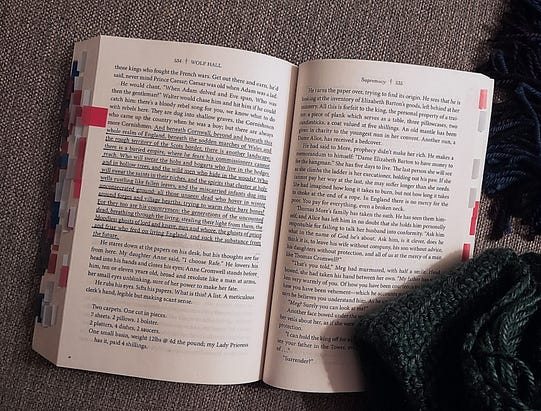Your subscription to The Reflective Eclectic has ended and you have lost your paid subscriber benefits. To retain paid access to The Reflective Eclectic, you can click the button below to resubscribe. |
Tuesday, 31 December 2024
Your subscription has ended
Monday, 30 December 2024
Empathy
You could make a meal of a moth, hang upside down and sleep, flap your arms and try to fly, and close your eyes and navigate by sound; but you will never, never really know what it’s like to be a bat. For starters, even if you were able to choke down a moth and fall asleep while hanging upside down, I don’t think you’ll succeed in flying. If you navigated by sound, it would be the sound of you crashing into things. But, even if you could, you still would not know what it’s like to be a bat. The best you could do is know what it’s like for a human to be a bat. That’s not even close to the same thing. The Reflective Eclectic is a reader-supported publication. To receive new posts and support my work, consider becoming a free or paid subscriber. You might think you know something about flying if you’ve ever been in an airplane; but, in reality, you didn’t fly as a bat flies, you were shot through the air by a machine while sitting in a metal tube. You might think you know something about navigating by sound if you’re a sonar operator; but, you’re not navigating by sound, a machine is doing it for you. That’s very different than being born with the capability and doing it naturally. What it’s like to be a bat was the subject of an important essay by philosopher, Thomas Nagel. He was interested in refuting reductionism, the philosophical position that a complex system is nothing more than the sum of its parts. We find reductionism all the time, when people say that a thought or a feeling is nothing more than a bunch of nerves firing in the brain. To the neurologist, it may be; but to the person possessing the brain, the experience of, say, smelling a flower is far greater than can be expressed in a chemical equation or a chart of the regions of the brain that had been involved. When I read Nagel’s essay, I wasn’t so interested in bats, or in reductionism. The essay got me to thinking about empathy. I’m a therapist, so I was interested in knowing what it’s like to be my last client, who wasn’t a bat. The client was a young woman, anxious about her new job, and worried that she’d never find anyone who would love her. This person’s experience is not entirely foreign to me. I was young once, although I’m not young now. I know what it’s like to start a new job, and I’ve had my days when I thought I’d always be alone. However, I am not, nor have I ever been a woman; but I can imagine it. I’ve heard enough women talk about how things are for them, that I can put myself in their place and extrapolate what it would be like for me. I could employ my mirror neurons while talking to this young woman. That might give me some insight into her experience. Employing mirror neurons works like this. You look at the expression on the face of the person you’re talking to and mold your own face to match that expression. Then your own face makes you feel what the other person is feeling. As strange as these operations sound, psychologists say we do it all the time, unconsciously, as a way of connecting with the emotions of others. The term we have for all these procedures of understanding the experience of another is empathy. We counselors are instructed to use empathy in our counseling, but Nagel’s essay has got me wondering what empathy is, and if it’s even possible. The Oxford English Dictionary defines empathy as the ability to understand and share the feelings of another. To the extent that I’m able to empathize with this young woman, it’s because I thumb through my mental files and pull out a version of myself that is young again, new to my job, and lonely. That’s not enough, though. I also have to construct a version of myself that is female, according to the specifications of femininity I have heard. Even that’s not enough, for this person is a Gen Z, while I’m of the boomer generation. Gen Z’s differ from boomers to a small degree in ways we scarcely know. She has a whole history that is different from mine. We had different parents, read different books, have been to different places, etc. Strictly speaking, I can never know exactly what it’s like to be her; I can only know what it would be like for me to imagine I’m her. With her, at least, I can check out my perceptions, which I can’t with a bat. I can say, for instance, “You must be scared about the future.” That’s how I would feel if I were her. If she says, “Yes, I’m scared,” I might think I’ve got it right, but is my scared the same experience as her scared? Let’s say I go ahead on the assumption that she’s scared in the same way I would be scared if I were her. I might set about to try to reassure her that everything is going to be OK because that’s what I would want to hear if I were her. Well, who am I counseling here, me or her? I’m counseling a fictionalized version of me that’s representing her. Not only could I be not giving her what she needs, but anything I say about her, really tells you more about me. I’m convinced that these difficulties would be present even if this client was just like me. Even if she were a clone of me, the moment our two parts were created, our inner experiences would be different, and I would have no way of knowing whether I correctly understood her inner life. To sum it all up: true, accurate empathy is impossible. There’s no way of knowing what it’s like to be another person, much less a bat. Still, it’s better when we try to be empathetic than when we don’t try. At least that brings us closer to getting it right. You may feel very isolated, hearing that empathy is impossible, I wouldn’t know for sure. But, I think empathy being impossible is what makes your point of view so precious. No one has another point of view just like it. It’s the reason you are deserving of respect. Thanks for reading The Reflective Eclectic! This post is public so feel free to share it. Invite your friends and earn rewardsIf you enjoy The Reflective Eclectic, share it with your friends and earn rewards when they subscribe. © 2024 Keith Wilson |
Your gift subscription ends tomorrow.
Your gift subscription to The Reflective Eclectic is almost over. If you'd like to continue subscribing, just tap the link below: |
Sunday, 29 December 2024
Wolf Crawl: A Look Back
You don’t always fall in love with a book the first time you try it. Sometimes, you need to encounter a book when you’re a little older and have a little more life behind you. That’s how it was with me and Wolf Hall. I encountered it for the first time in 2014 or so. I’d heard plenty of buzz about the second book in Hilary Mantel’s Thomas Cromwell trilogy, and all of it was glowing. Everyone loved Bring up the Bodies, and back in 2014 I wasn’t sure what sorts of books I wanted to be reading. I picked up Wolf Hall while browsing at the library, because why not? It was about the Tudors and everyone was raving about it. I bounded off the book within the first chapter. What was with the present tense? What was going on with the perspective? It all felt very strange to me. I didn’t have the reading experience to grasp the kind of story that Mantel was telling me. Wolf Hall never left my mind. It was always there in the background, quietly reminding me that it was there until, five years later, I picked it up again. Reader, I was ready for it this time. I checked out the audiobook from the library and was hooked from the first moment when Simon Vance shouted “So now get up!” at me. I’d never come across historical fiction that made the past come to life so vividly. I was living in the twenty-first century, but somehow I was also living in 1520s England, following Thomas Cromwell around as he rose from being Cardinal Wolsey’s trusted clerk to being at the right hand of Henry VIII. I could see and hear and taste the Tudor era, I smirked at Thurston’s off-color jokes, and cried at the poignant death scenes Mantel conjured out of five-hundred-year-old records. I couldn’t wait to find out what happened next, and when I finished Wolf Hall I picked up Bring Up the Bodies as soon as I possibly could. I listened to that audiobook obsessively, because despite knowing exactly what would happen to Anne Boleyn and the five men who were accused alongside her, reading Mantel’s account of it was like reading about it all for the first time. Then came the wait- not a long one for me, as The Mirror and the Light was set to be released the following March (of 2020), but when you’re looking forward to something as much as I was looking forward to the next book, any wait feels interminable. It was in that interim, I believe, that I first came across Simon’s (@Footnotes and Tangents) book account on Instagram, followed him, and began commenting on his fantastic book reviews and the short stories he posted. When, in January or so of 2020, he suggested a readalong of The Mirror and the Light, I joined right away. It was nothing particularly organized- mostly, it was a handful of Mantel fans chatting about our impressions of the book as we were reading it, in March of 2020 as the covid pandemic began to wash over all of us. I finished the book on a snowy Sunday in April. Instead of devouring it as I usually do with books I’m looking forward to, I’d managed to reign myself in and take it fairly slowly. But on that cold and lonely Sunday afternoon with some 300 pages left, I fell under Mantel’s spell and didn’t stop reading until I came to that final page. When I closed the book, I remember blinking out of my window in confusion. I’d just been in London on a hot summer’s day in 1540. Why was it snowing outside? When I came fully back to the twenty-first century, I grabbed my phone and wrote about it in the group chat. What did I say? Probably something inarticulate, laden with the emotion of the experience I’d just been through. Whatever I said, it was comforting to know that other people were out there, going through the same literary experience I’d just been through. So of course, when Simon announced he was going to do a year-long readalong of the Thomas Cromwell trilogy, I was going to be part of that. I’d already joined in the 2023 War and Peace slow read, though I found that reading just a few pages each day kept me from retaining the information, so I read ahead and finished the book in a relatively breezy four months. The weekly format suited my reading style better, so I committed myself to Wolf Crawl. Was this one of the best bookish choices I’ve ever made? Yes. I read fast. I always have. My twitchy brain rarely allows me to slow down- especially when I’m enjoying a book. Wolf Crawl forced me to slow down in the story without altering my reading habits. Every Sunday afternoon, I would pull out the book and settle down to read the weekly pages, absorb them, and then read Simon’s post about it on Wednesday. Then I’d wait out the rest of the week, the book always on the shelf near my bed, until Sunday rolled around again. As the weeks passed, the passage of story time began to feel as real as the passage of real time. Both January 2024 and 1527 feel like they happened so long ago, now that I’ve finished the book with its ending in 1540 at the end of December 2024. Though this is the fourth time I’ve been through the entire trilogy, it took this reading to notice how thoroughly thread, cloth, and clothing are woven into the narrative, or how much food there is, or how many animals appear. These details I overlooked in my faster readings now feel more critical to the narrative as a whole. They are not so superfluous as I thought, though how I could have thought so in the first place is beyond me. Mantel was a master of her craft. She knew exactly what she was doing when she mentioned the almond cream given to Anne Boleyn, or had Gregory express disappointment in his black greyhounds. Then there’s the revelation that Simon had toward the end of Wolf Crawl: that Thomas Cromwell, the master of memory who knew the New Testament by heart, was not as reliable a narrator as we always thought he was. At the beginning of it all in Wolf Hall, we see Cromwell on his way up in the world. He thinks the best of himself and constantly reminds himself- and us- that he is better than what he was raised to be. He is not Walter. He’s made something of himself. He is a great man and will be greater still if he has his way. Toward the end of The Mirror and the Light, the brilliant tapestry Cromwell has woven about himself begins to unravel. We see childhood memories come back, not tinged with golden light and a blackbird’s song, but stained with Thames mud and the stomping of a boy determined to ruffle the feathers of the upper classes. We’re left to wonder if those events in Wolf Hall happened quite the way Cromwell thinks they did, or if he was trying to remember himself as better than he was. Was he lying to himself, and therefore lying to us as well? The best books stick with you, make you stop and think and reconsider the world you live in, or at least make you reconsider how you look at literature. Wolf Hall, Bring up the Bodies, and The Mirror and the Light have spoiled me, really. Now that I know how electric and how immediate historical fiction can be, it’s hard to find such novels that even begin to measure up. Mantel’s use of language and perspective are nothing short of astonishing. Every time I come back to these books, I find something new to admire about them. To really crack them open, though, I needed a good guide to make me slow down and savor them, to ponder the threads of the tale, and to reconsider pretty much everything I thought I knew about these books. So thank you, Simon, for getting me to not be in such a hurry. Let’s do it all again next year, shall we? Traveling in Books is free today. But if you enjoyed this post, you can tell Traveling in Books that their writing is valuable by pledging a future subscription. You won't be charged unless they enable payments. © 2024 Kim and the Cat |
Episode 15 - Pardon Me?
Listen now (94 mins) | Reforming the presidential pardon power, going after Venezuela, and dealing with legalized sports betting. ͏ ͏ ...
-
https://advanceinstitute.com.au/2024/04/24/sunnycare-aged-care-week-10/?page_id=...
-
barbaraturneywielandpoetess posted: " life on a rooftop can be short ; depends whether one looks down or up . ...



